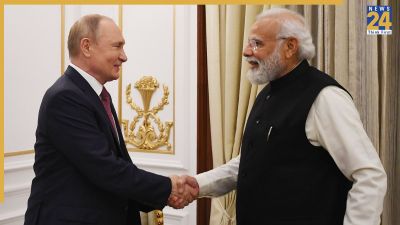At IIT Bombay’s Techfest 2024, Jeet Adani opened his keynote address with a question that struck at the heart of the event: “How would myou define technology?” He argued that technology, while traditionally seen as a tool to solve problems, must go beyond mere functionality to serve a higher purpose. “Technology is not the end – it is the means to an end,” he said.
“The end we define for ourselves must meet the needs of our society and our nation.” Jeet, the 27-year-old younger son of infrastructure king Gautam Adani, illustrated how purpose-driven technology is transforming industries and lives across the world. Even as he hailed Google’s new quantum computing chip, Willow, as a revolutionary breakthrough with immense potential for positive impact in areas like drug discovery, renewable energy and climate change, he cautioned that such power also comes with
responsibility. “What you do with that kind of power is a choice – whether to solve the world’s problems or create new ones.”
Urging students to anchor their technological pursuits to societal goals, he called on the next generation to drive progress responsibly, ensuring that technology uplifts humanity and fosters inclusivity. India, Jeet noted, has already embraced technology with purpose through initiatives like UPI and Digital India, which have made financial and digital services accessible to millions. India’s 180 billion cashless transactions a year is, he pointed out, a far bigger number than every advanced economy, whether it
is the US or the UK or Singapore or any of the developed countries in Europe. “India is in overdrive, and for good reason,” he said. “Harnessing technology is crucial not just for economic growth but for addressing long-standing challenges in healthcare, education, and governance.”
Reflecting on his role leading “all things digital” at the Adani Group, he said the group has integrated purpose into its technological advancements. In Adani-operated ports, simulation-based training is improving workplace safety. At Adani-managed airports,
innovations like DigiYatra, eGates and the “aviio” app are enhancing the passenger
experience. Meanwhile, energy projects such as the Khavda renewable power plant in
Gujarat, set to become the world’s largest clean energy project, are leveraging cuttingedge technologies to accelerate construction. “At Khavda, we’re adding 25 MW of clean
energy every single day,” he said. “That’s like building a project the size of our earlier
global milestone, the Kamuthi solar plant, every month. Khavda is super-massive, and
it’s driven by the beneficial use of technology to make a real difference.”
Congratulating D Gukesh on becoming the youngest-ever world champion in classical
chess, Jeet recounted a conversation his father Gautam Adani had with another chess
wizard, R Praggnanandhaa. “When Pragg said his opponents were preparing for their
matches using extremely powerful machines built with hundreds of cores and stacks
of GPUs to run super-strong chess engines like Stockfish and Leela, my father told
him: “You too should have it. Take advantage of technology. Don’t wait.””
Jeet also highlighted the Adani Foundation’s efforts to leverage technology for social
impact. Programmes like Saksham, which integrates AI and VR for skill development,
and SuPoshan, which uses mobile apps for real-time health monitoring, exemplify how
purpose-driven innovation can uplift communities. “These initiatives,” he said, “show
how technology, when aligned with purpose, can create lasting social and economic
progress.”
While championing the potential of technology, Jeet also cautioned against its misuse.
“The harmful use of technology – fake news, cybercrime, online scams – is growing
just as fast as its beneficial use,” he warned. “As the scope of technology expands, our
generation must ensure that its application uplifts rather than harms.”
Jeet concluded by urging the IIT-ians to prioritise purpose in their technological
pursuits. “Chasing the new wave of technology mindlessly, without a larger purpose,
won’t do us any good,” he said. “We must develop and encourage technological
solutions that serve humanity, foster inclusivity, and drive progress for all.”
The keynote address left the young audience inspired to rethink their approach to
innovation, aligning their skills with meaningful goals. As India aspires to become a
$26 trillion economy by 2047, Jeet Adani’s message underscored the critical role of
purpose-driven technology in shaping a future that benefits everyone.
Also Read: IIT Bombay Techfest 2024: Jeet Adani’s Groundbreaking Address On Technology And Innovation













